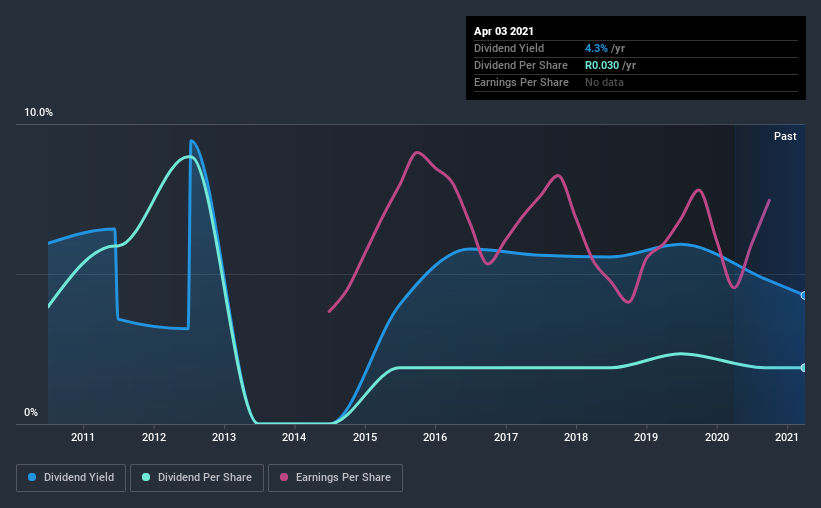
Dividend paying stocks like Nictus Limited (JSE:NCS) tend to be popular with investors, and for good reason - some research suggests a significant amount of all stock market returns come from reinvested dividends. On the other hand, investors have been known to buy a stock because of its yield, and then lose money if the company's dividend doesn't live up to expectations.
In this case, Nictus likely looks attractive to investors, given its 4.3% dividend yield and a payment history of over ten years. We'd guess that plenty of investors have purchased it for the income. During the year, the company also conducted a buyback equivalent to around 11% of its market capitalisation. That said, the recent jump in the share price will make Nictus's dividend yield look smaller, even though the company prospects could be improving. Some simple analysis can reduce the risk of holding Nictus for its dividend, and we'll focus on the most important aspects below.
Explore this interactive chart for our latest analysis on Nictus!

Payout ratios
Dividends are typically paid from company earnings. If a company pays more in dividends than it earned, then the dividend might become unsustainable - hardly an ideal situation. So we need to form a view on if a company's dividend is sustainable, relative to its net profit after tax. In the last year, Nictus paid out 27% of its profit as dividends. A medium payout ratio strikes a good balance between paying dividends, and keeping enough back to invest in the business. Plus, there is room to increase the payout ratio over time.
We update our data on Nictus every 24 hours, so you can always get our latest analysis of its financial health, here.
Dividend Volatility
One of the major risks of relying on dividend income, is the potential for a company to struggle financially and cut its dividend. Not only is your income cut, but the value of your investment declines as well - nasty. For the purpose of this article, we only scrutinise the last decade of Nictus' dividend payments. The dividend has been cut on at least one occasion historically. During the past 10-year period, the first annual payment was R0.06 in 2011, compared to R0.03 last year. This works out to be a decline of approximately 7.1% per year over that time. Nictus' dividend hasn't shrunk linearly at 7.1% per annum, but the CAGR is a useful estimate of the historical rate of change.
When a company's per-share dividend falls we question if this reflects poorly on either external business conditions, or the company's capital allocation decisions. Either way, we find it hard to get excited about a company with a declining dividend.
Dividend Growth Potential
Given that dividend payments have been shrinking like a glacier in a warming world, we need to check if there are some bright spots on the horizon. In the last five years, Nictus' earnings per share have shrunk at approximately 3.8% per annum. Declining earnings per share over a number of years is not a great sign for the dividend investor. Without some improvement, this does not bode well for the long term value of a company's dividend.
Conclusion
When we look at a dividend stock, we need to form a judgement on whether the dividend will grow, if the company is able to maintain it in a wide range of economic circumstances, and if the dividend payout is sustainable. We're glad to see Nictus has a low payout ratio, as this suggests earnings are being reinvested in the business. Earnings per share have been falling, and the company has cut its dividend at least once in the past. From a dividend perspective, this is a cause for concern. Nictus might not be a bad business, but it doesn't show all of the characteristics we look for in a dividend stock.
Market movements attest to how highly valued a consistent dividend policy is compared to one which is more unpredictable. Still, investors need to consider a host of other factors, apart from dividend payments, when analysing a company. Case in point: We've spotted 5 warning signs for Nictus (of which 2 are a bit unpleasant!) you should know about.
We have also put together a list of global stocks with a market capitalisation above $1bn and yielding more 3%.
When trading Nictus or any other investment, use the platform considered by many to be the Professional's Gateway to the Worlds Market, Interactive Brokers. You get the lowest-cost* trading on stocks, options, futures, forex, bonds and funds worldwide from a single integrated account. Promoted
Valuation is complex, but we're here to simplify it.
Discover if Nictus might be undervalued or overvalued with our detailed analysis, featuring fair value estimates, potential risks, dividends, insider trades, and its financial condition.
Access Free AnalysisThis article by Simply Wall St is general in nature. It does not constitute a recommendation to buy or sell any stock, and does not take account of your objectives, or your financial situation. We aim to bring you long-term focused analysis driven by fundamental data. Note that our analysis may not factor in the latest price-sensitive company announcements or qualitative material. Simply Wall St has no position in any stocks mentioned.
*Interactive Brokers Rated Lowest Cost Broker by StockBrokers.com Annual Online Review 2020
Have feedback on this article? Concerned about the content? Get in touch with us directly. Alternatively, email editorial-team (at) simplywallst.com.
About JSE:NCS
Nictus
An investment holding company, operates as a retailer of household furniture, electrical appliances, and home electronics under the Nictus brand in South Africa.
Flawless balance sheet with solid track record.
Market Insights
Community Narratives



